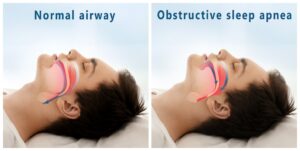 Rheumatoid arthritis is a chronic condition that causes several symptoms that can affect your quality of life, like pain in your joints, swelling, weight loss, fever, and fatigue. If you’re finding it difficult to make it through your day without more caffeine, your ongoing fatigue may be a sign of another condition. Sleep apnea and rheumatoid arthritis can go hand in hand. Here’s what you need to know to prevent potentially life-threatening complications.
Rheumatoid arthritis is a chronic condition that causes several symptoms that can affect your quality of life, like pain in your joints, swelling, weight loss, fever, and fatigue. If you’re finding it difficult to make it through your day without more caffeine, your ongoing fatigue may be a sign of another condition. Sleep apnea and rheumatoid arthritis can go hand in hand. Here’s what you need to know to prevent potentially life-threatening complications.
What is Sleep Apnea?
Obstructive sleep apnea is a common condition that causes frequent breathing disruptions while sleeping. The soft tissues in the back of the mouth and tongue can collapse to block the airway as your muscles relax. This can lead to hundreds of pauses in breathing every night. Not only does this affect your sleep quality, but it also depletes your body of oxygen. With no treatment, you can be at risk of several serious health issues, like cardiovascular disease, poor mental health, diabetes, and sleep deprivation.
Rheumatoid Arthritis Linked to Sleep Apnea
Several factors can increase a person’s risk of sleep apnea, like obesity or a large neck circumference. However, new research has found a connection between sleep apnea and rheumatoid arthritis.
The autoimmune disease causes widespread pain, swelling, and stiffness of joints, but 57% of rheumatoid arthritis sufferers also experience insomnia. Although chronic pain is a leading cause of sleepless nights, rheumatoid arthritis can increase your risk of sleep apnea by 75%. The autoimmune disorder can cause structural abnormalities of the spine, neck, and head, like an underdeveloped lower jaw, reduction of airway size, or narrowing of the cervical vertebrae. Airway restrictions can lead to obstructive sleep apnea.
Treating Sleep Apnea
Better nights’ rest are possible with sleep apnea treatment. You have multiple options to treat the breathing disorder, including:
- CPAP: A CPAP machine is a device that delivers air through a mask worn over the mouth or nose. It is effective at stopping breathing disruptions to improve your health and sleep quality.
- Oral Appliance: An oral appliance is a custom-fit device that prevents your tongue and soft tissues from obstructing the airway. It’s a comfortable, effective treatment for patients with mild-to-moderate obstructive sleep apnea. It can be used alone or along with a CPAP.
Fatigue is only one symptom of sleep apnea. Chronic snoring, morning headaches, and mood changes are also signs of the disorder. Your sleep specialist can provide the personalized treatment you need to breathe and sleep better.
About Dr. Pamela West
Dr. West has over 3 decades of experience in dentistry. Since earning her dental degree from the University of Southern California Dental School, she has completed thousands of hours of advanced training in many specialties, like sleep apnea therapy and neuromuscular/craniofacial pain. Dr. West is a proud member of many professional organizations, including the American Academy of Sleep Medicine. Request an appointment through her website or call her office at (702) 602-4000.
